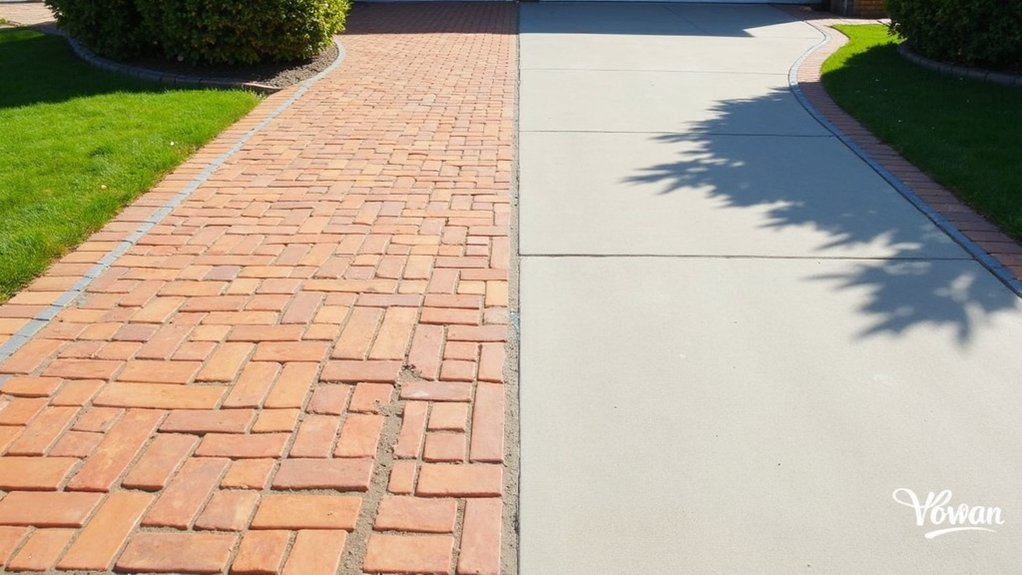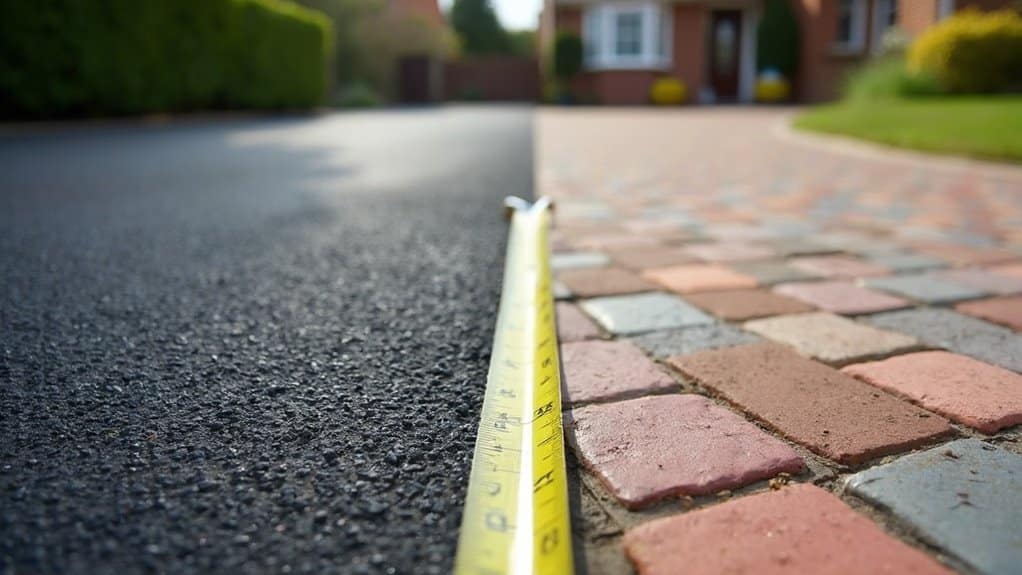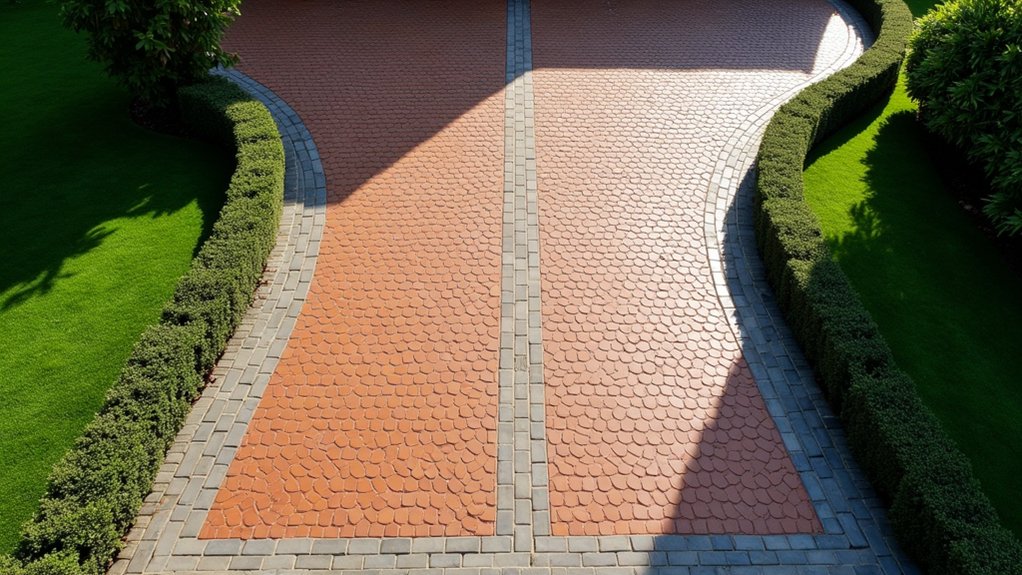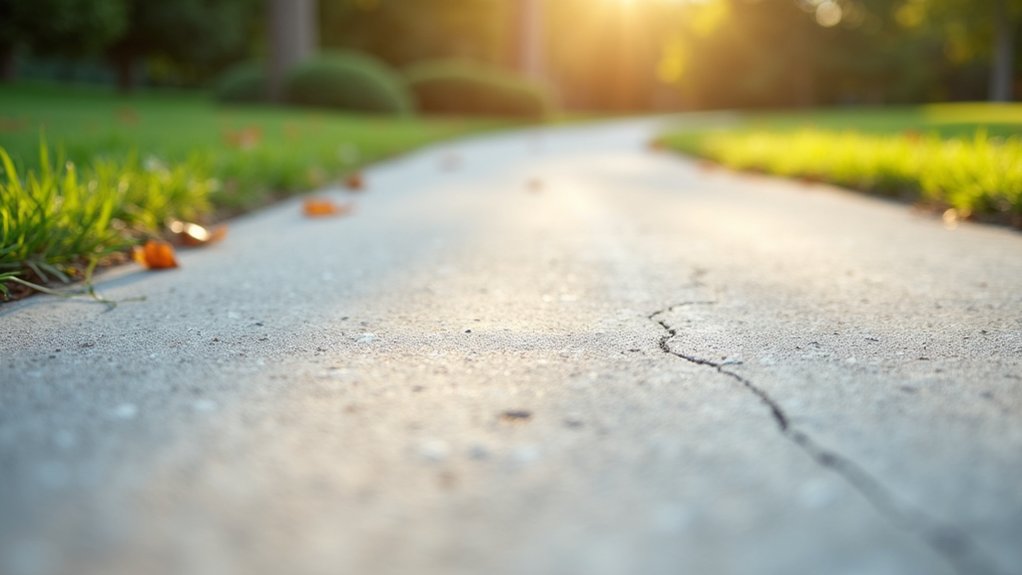When comparing block paving and concrete driveways, you’ll often find that block paving offers better long-term value. While the initial cost may be higher, its durability—lasting over 30 years and easy to repair—can save you money on maintenance. In contrast, concrete may be cheaper to install initially, but it can crack and lead to expensive repairs sooner. Opting for block paving not only boosts your property’s kerb appeal but can also enhance its resale value. Explore the benefits of each option to make an informed choice!
Table of Contents
ToggleKey Takeaways
Concrete driveways are usually the more affordable option, costing between £4,000 and £8,600 for a standard two-car driveway. In contrast, paver materials can range from £5 to £30 per square foot, resulting in installation costs of £5,500 to £14,500. Basic poured concrete is available for under £10 per square foot, making it the most budget-friendly choice.
When it comes to repairs, block paving is generally cheaper and easier to fix than concrete, which can help save on long-term maintenance costs. Additionally, homes with paver driveways often sell for a higher price, adding value despite the steeper initial investment.
Initial Installation Costs Comparison
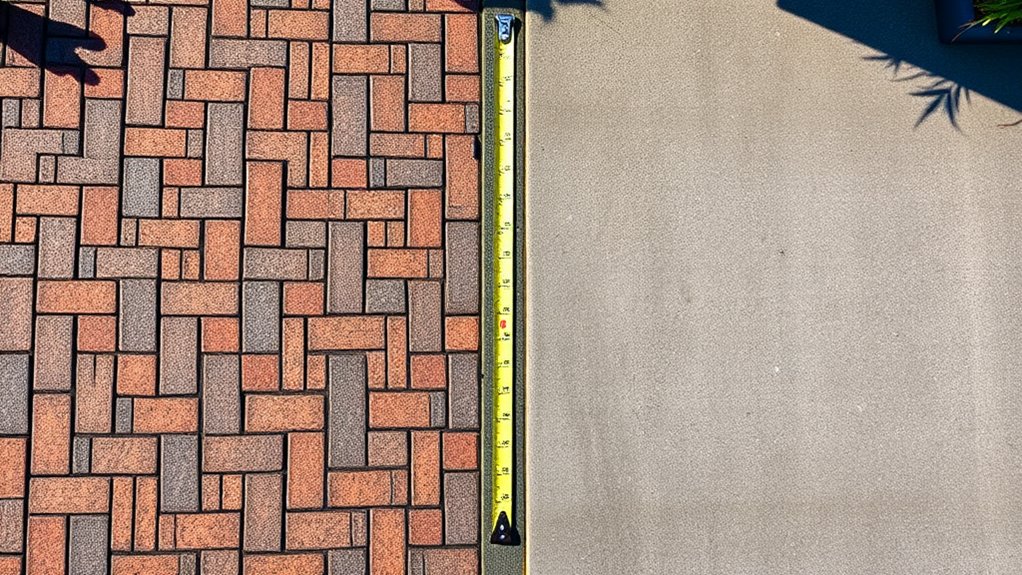
When comparing initial installation costs, understanding the differences between block paving and concrete driveways can help you save money.
Basic poured concrete typically costs under £10 per square foot, making it a more affordable option than pavers. Paver materials range from £5 to £30 per square foot, but their installation is more labour-intensive, leading to higher overall costs. For a standard two-car driveway, concrete may cost between £4,000 and £8,600, while pavers could set you back £5,500 to £14,500. This comparison shows that if you’re after a budget-friendly option, concrete driveways usually offer the most cost-effective solution without compromising on quality. Additionally, paver installation requires more time and labor compared to poured concrete, further contributing to the higher costs associated with this option.
Durability and Lifespan of Driveways
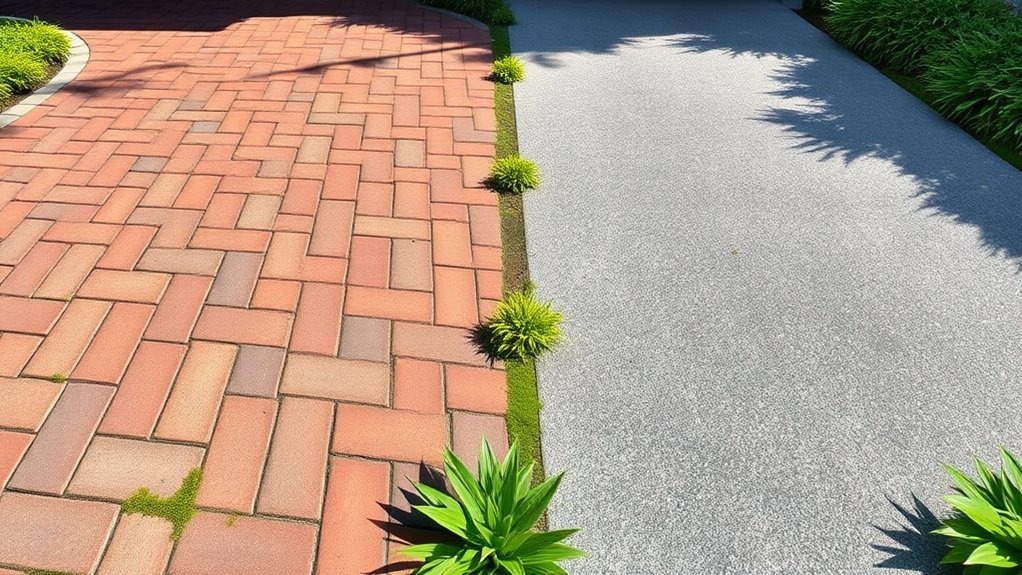
When it comes to durability, block paving typically lasts longer than concrete driveways, particularly with proper maintenance. Block paving is more adaptable to ground movement and allows for straightforward repairs, whereas concrete can crack and often needs more frequent attention. Additionally, the longevity of block paving means it can last 20 to 30 years or more, further solidifying its status as a reliable driveway option. Understanding these differences will help you choose the best option for your requirements. Furthermore, resin surfaces are known for exceptional durability and can often surpass the lifespan of both block paving and concrete driveways.
Lifespan Comparison
Lifespan Comparison
Both block paving and concrete driveways offer good durability, but their lifespans can differ significantly depending on the quality of installation and maintenance. Here’s a quick comparison:
- Block Paving: Generally lasts over 30 years with proper care, thanks to its flexibility and the ease of making local repairs.
- Concrete Driveways: Can last between 25 to 50 years if high-quality materials and installation methods are employed, but they may crack sooner if conditions are poor. Additionally, concrete driveways have a lifespan of about 10-20 years with frequent cracking if not properly maintained. The durability of concrete can be enhanced by proper care and timely repairs.
- Environmental Impact: Block paving is permeable, allowing for better water drainage and reducing flood risks compared to solid concrete.
- Maintenance: Regular maintenance is crucial for both types; neglecting it can significantly shorten their lifespan.
Investing in quality installation and ongoing maintenance will enhance the longevity of either option.
Repair Frequency
Repair frequency is crucial for ensuring the longevity of both block paving and concrete driveways. Neglecting repairs can lead to hefty costs down the line. Knowing the repair requirements for each type can aid in making a sound choice.
| Driveway Type | Repair Techniques | Preventative Measures |
|---|---|---|
| Block Paving | Simple block replacement | Regular cleaning and sealing |
| Concrete | Filling cracks, resurfacing | Protective coatings |
| Both | Routine inspections and maintenance | Effective drainage systems |
Block paving typically requires more frequent, yet less expensive repairs, whereas concrete repairs can be more extensive and costly. By using the right repair methods and preventative measures, you can prolong your driveway’s life and minimise future expenses. Additionally, proper installation ensures that both types can withstand diverse weather conditions, ultimately affecting their repair frequency.
Ground Movement Resistance
Understanding repair frequency is key to appreciating the role of ground movement resistance in the longevity of your driveway. When considering durability, keep these factors in mind:
- Soil Stability: Unstable soil can lead to uneven settling in concrete, resulting in cracks.
- Drainage Systems: Proper drainage is essential to prevent water build-up, which can worsen damage.
- Material Flexibility: Block paving’s interlocking design allows for slight ground movements without cracking, unlike rigid concrete.
- Environmental Impact: Concrete is vulnerable to freeze-thaw cycles, which heighten the risk of cracking.
Opting for block paving instead of concrete can significantly extend your driveway’s lifespan, thanks to its superior resistance to ground movement.
The flexibility of pavers, coupled with efficient drainage, ensures fewer repairs and greater long-term satisfaction.
Maintenance and Repair Considerations
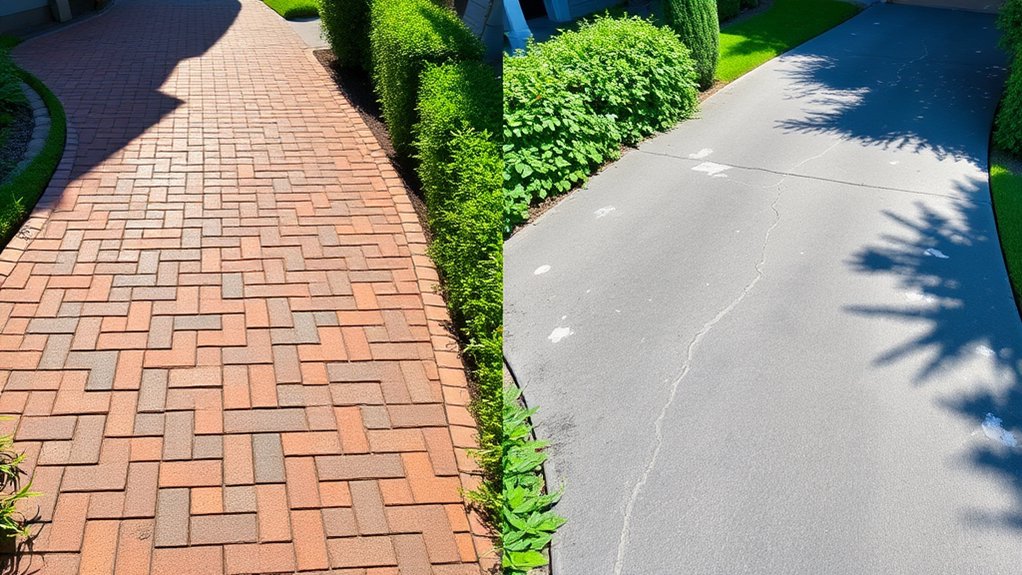
When deciding between block paving and concrete driveways, maintenance and repair considerations are crucial.
Concrete requires more frequent upkeep and can lead to higher repair costs. In contrast, block paving allows for easier individual repairs that blend well with the existing surface.
For instance, if a single paver becomes damaged, you can replace it without needing to resurface the entire area.
Understanding these differences will help you assess the long-term value of each option more effectively.
Repair Process Differences
When choosing between block paving and concrete for your driveway, it’s essential to consider not just the installation costs but also the differences in maintenance and repair.
Here’s a concise overview of the key distinctions in repair processes:
- Repair Techniques: With block paving, you can easily lift and replace individual blocks, making repairs straightforward. In contrast, concrete repairs often involve filling cracks or resurfacing larger sections, which can be more labour-intensive.
- Skill Level Required: Repairs for block paving are generally DIY-friendly, allowing homeowners to tackle minor issues themselves. Conversely, concrete repairs usually require professional skills, particularly for larger or more complex problems.
- Materials Needed: Repairing block paving typically requires affordable materials such as sand and replacement blocks. In comparison, concrete repairs often need specialised and pricier materials, which can increase overall costs.
- Aesthetic Considerations: Repairs to block paving tend to blend in well with existing surfaces, maintaining a uniform look. However, concrete patches can stand out and be more noticeable, potentially affecting the driveway’s overall appearance.
Maintenance Frequency Comparison
When comparing block paving and concrete driveways, their maintenance needs vary significantly, which can affect your long-term investment. Block paving requires more regular upkeep, but it offers distinct maintenance advantages, necessitating regular cleaning to maintain its appearance.
| Maintenance Type | Block Paving | Concrete Driveway |
|---|---|---|
| Surface Sweeping | Weekly | Monthly or as required |
| Deep Cleaning | Every 6–12 months | Every 5–10 years |
| Sealing | Every 3–5 years | Every 5–10 years |
While block paving needs more attention, it allows for simpler repairs if individual blocks become damaged. In contrast, concrete driveways may require less frequent maintenance, but repairs can be more expensive if issues arise.
Cost of Repairs
Understanding the cost of repairs for block paving compared to concrete driveways is essential for making an informed investment choice. Here’s a straightforward repair cost analysis:
- Material Costs: Block paving repair materials typically range from £10 to £50 per square metre, while concrete costs between £4 and £15.
- Labour Expenses: Labour costs can vary significantly; hiring professionals for either type ensures quality but will increase overall expenses.
- Extent of Repairs: Extensive damage might require full replacement, which can significantly impact your budget.
- Permit Fees: Local regulations may necessitate permits, adding to your repair costs.
It’s crucial to consider the quality of repair materials; investing in higher-quality options can help reduce future repair needs.
Ultimately, understanding these factors will enable you to choose the most cost-effective option for your driveway.
Aesthetic and Customization Options
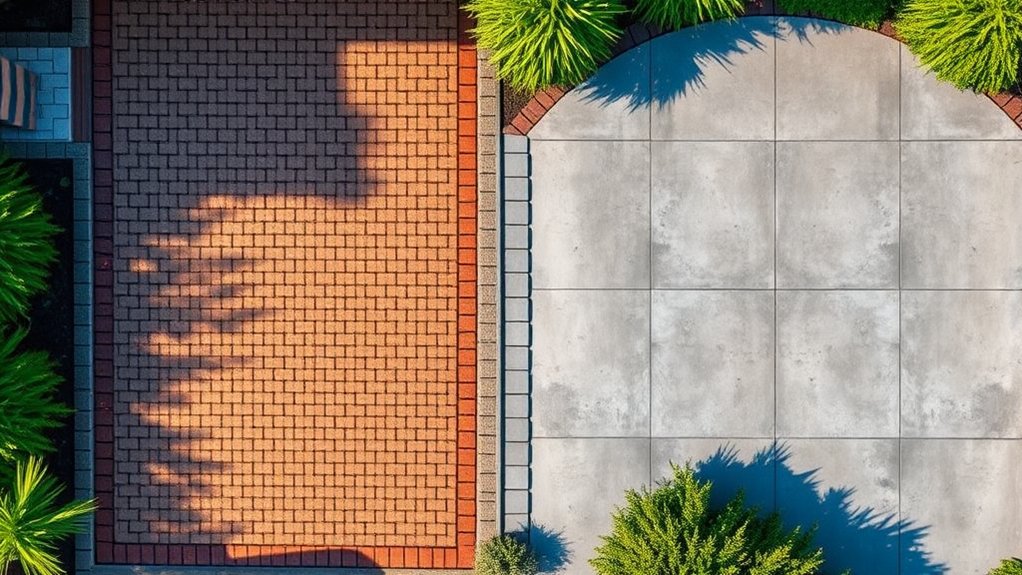
When it comes to the aesthetic and customization options for your driveway, block paving truly shines with its versatility.
You can choose from a variety of colour combinations, from natural stone to bright synthetic hues, allowing for a personalised look.
Block paving also offers numerous design patterns; styles like herringbone or basketweave can enhance your driveway’s character.
Unlike concrete, which has limited design options, block pavers allow you to add borders and insets for extra detail.
The natural stone pavers not only look great but also provide slip resistance and a warm touch.
Installation and Labor Requirements
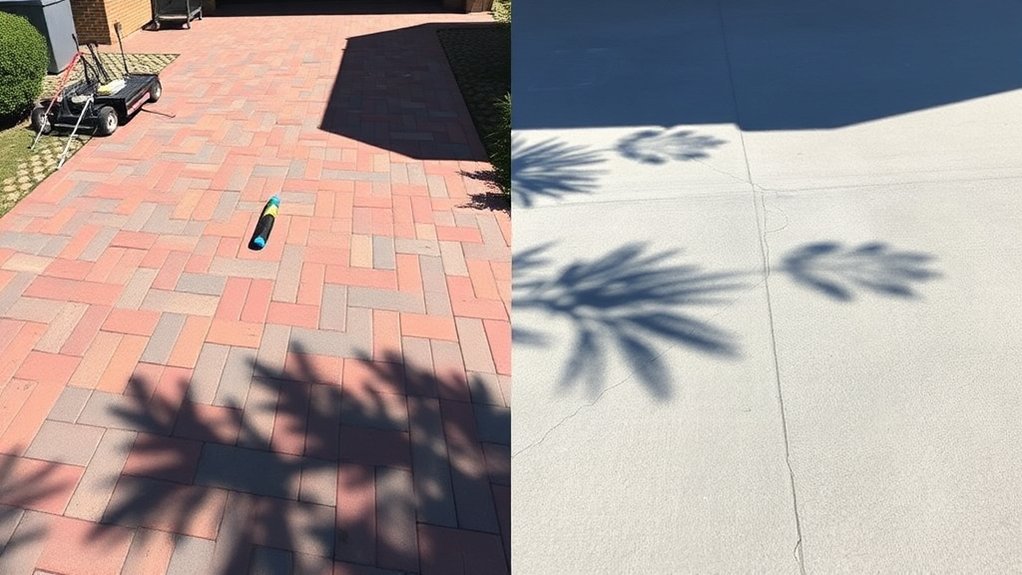
Installing a driveway has different labour requirements depending on whether you opt for block paving or concrete. Block paving is generally more labour-intensive, as each paver is laid individually, while concrete is poured in larger sections, making it more efficient.
Here are some key points to consider:
- Installation Techniques: Block paving requires careful grading, base preparation, and sand filling, whereas concrete needs only a compacted gravel base.
- Project Duration: Paving projects usually take longer due to the precise placement of each paver.
- Labour Costs: The cost for paver installation can start at £7–£15 per sq. ft., often making it twice as expensive as concrete installation.
- Installation Complexity: Pavers can be tricky to fit together, which increases the risk of mistakes and adds to the labour intensity.
Choosing the right option can significantly impact your budget.
Long-Term Value and Resale Impact
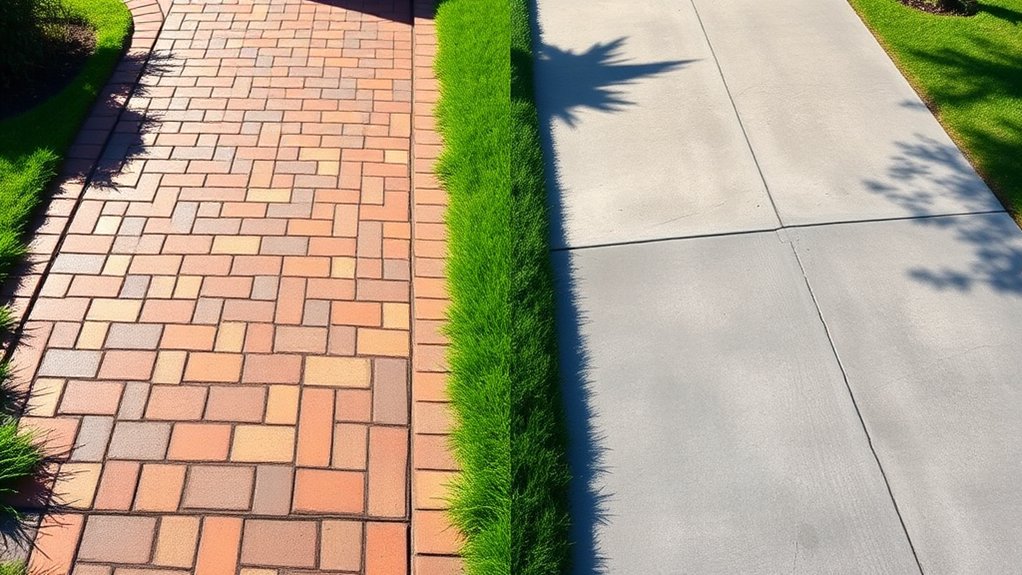
Both block paving and concrete driveways can improve your property, but pavers generally offer better long-term value and resale potential. Pavers are a smart investment; they can last over 30 years with little maintenance.
In contrast, concrete driveways are prone to cracking and can incur costly repairs. With pavers, if one block gets damaged, you can easily replace it without having to redo the entire driveway, saving time and money.
Additionally, pavers add significant aesthetic appeal to your home. Buyers often prefer the stylish and customizable look of block paving, which can lead to higher sale prices.
Research indicates that homes with paver driveways typically sell for more than those with standard concrete. In short, opting for pavers not only enhances your home’s appearance but also benefits your finances in the long run.
Budget-Friendly Options for Homeowners
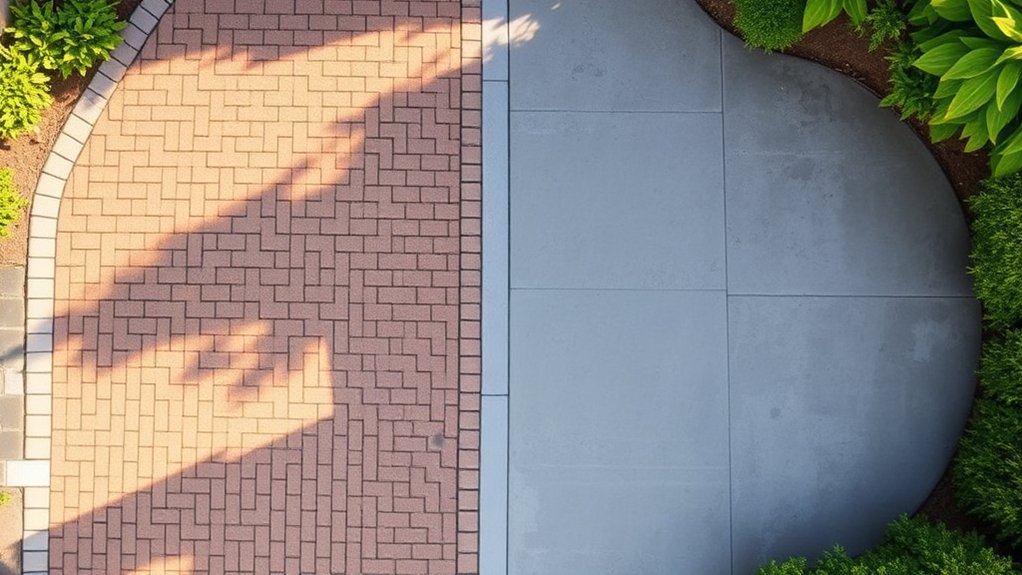
Enhancing your property’s value with a new driveway doesn’t need to be costly.
With some clever budgeting, you can achieve an impressive look without overspending. Here are some budget-friendly options to consider:
- Plain Concrete: This is the most economical option, costing around £3–£6 per square foot, ideal for tight budgets.
- Simple Designs: Opt for basic shapes to cut down on labour costs associated with more intricate installations.
- DIY Maintenance: Keeping up with regular concrete care can help you avoid expensive repairs down the line.
- Paver Selection: If you prefer block paving, choose simpler styles that require less intensive groundwork.
With these strategies, you can create a stylish driveway that fits your budget.
Final Thoughts on Driveway Choices
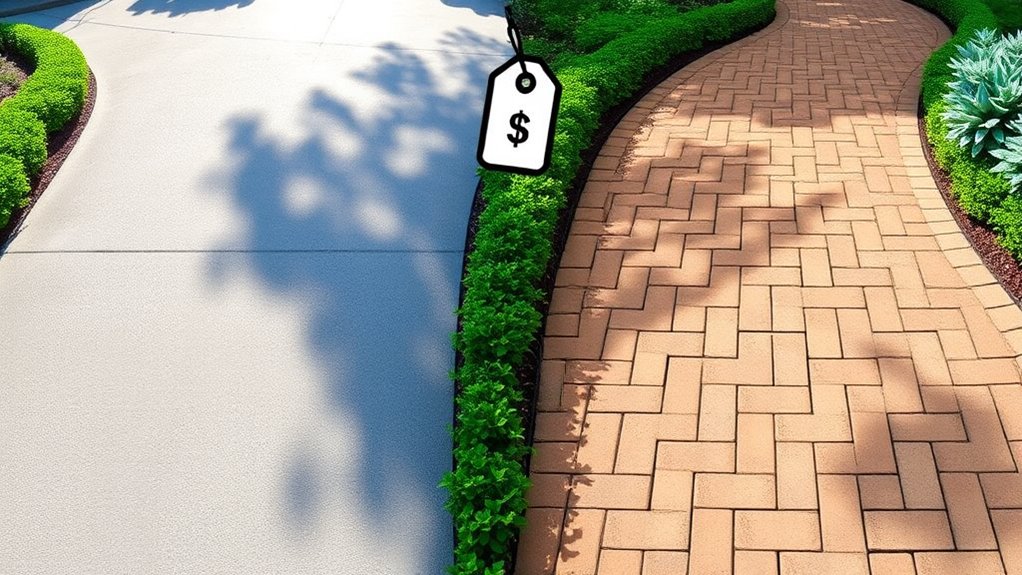
When selecting the right driveway for your home, it’s important to consider the long-term benefits and costs of each option.
Concrete driveways may have a higher upfront cost, but their durability can save you money in the long run.
Block paving provides aesthetic versatility and is easier to repair, although it may need occasional maintenance.
Don’t forget to think about the environmental impact of your materials; pavers can enhance drainage and reduce runoff, which is vital for managing climate issues.
While asphalt and gravel may appear more budget-friendly at first, their ongoing maintenance can add up.
Ultimately, weigh the cost, appearance, and environmental factors to choose a driveway that suits your needs and boosts your property’s value.
Frequently Asked Questions
What Are the Environmental Impacts of Block Paving Versus Concrete Driveways?
When looking at environmental impacts, block paving is generally more sustainable than concrete driveways. It offers better water management, reducing surface runoff and helping with drainage. Additionally, many block paving materials can be recycled, making them a greener option overall.
How Do Weather Conditions Affect Block Paving and Concrete Driveways?
Think of your driveway as a frontline against the weather. Durability is key; freeze-thaw cycles can cause serious damage to both block paving and concrete. However, the flexibility of block paving often allows it to cope better with harsh conditions. For instance, if a heavy frost hits, concrete may crack, while pavers can shift slightly without breaking.
Can I Install Block Paving or Concrete Myself?
You can certainly attempt to install block paving or concrete yourself, provided you have the necessary skills and tools. While it can save you money, be cautious—mistakes may lead to costly repairs. If you’re not confident, it might be worth considering hiring a professional.
What Is the Best Type of Sealant for Concrete Driveways?
Choosing the right sealant for your concrete driveway can greatly improve its durability. Acrylic sealants are user-friendly and easy to apply, making them a popular choice for DIY enthusiasts. On the other hand, polyurethane sealants offer superior protection but typically require professional application due to their complexity. Both options effectively guard against stains and water damage, so consider your skill level and the level of protection you need when making your choice.
How Do Local Building Codes Affect Driveway Installation Choices?
Local building codes significantly influence your driveway options. You’ll need installation permits to ensure compliance with zoning regulations, which can specify materials, design, and drainage requirements. For instance, certain areas may require permeable paving to manage rainwater runoff. Ignoring these regulations can result in fines and expensive modifications, so it’s essential to check local guidelines before starting your project.
Conclusion
When deciding between block paving and concrete driveways, it’s important to consider both initial costs and long-term advantages. A well-maintained block paving driveway can last up to 30 years, compared to concrete’s typical lifespan of 20 years. This durability could save you money over time. Choosing the right driveway option not only improves your home’s curb appeal but can also enhance its overall value, making it a wise investment for homeowners.
Looking for an affordable driveway option? Discover the cost differences between tarmac and block paving that could impact your decision.
Get inspired by the best block paving patterns for driveways that blend style and durability; discover which layout will elevate Read more
Learn about the lifespan and durability of concrete driveways, and discover essential tips to ensure yours lasts for decades to Read more

